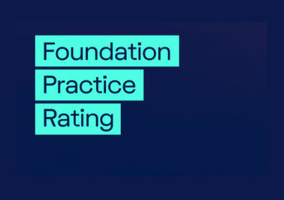Just three out of 100 UK grantmakers assessed on their public disclosures on diversity, transparency and accountability as part of a groundbreaking new study, scored the highest possible mark, an A.
The Foundation Practice Rating, instigated by Friends Provident Foundation (FPF) and funded by it and nine other foundations, publishes its first-year findings exclusively in Governance & Leadership magazine today.
The project examines grantmakers’ performance on their approach to transparency, accountability, and staff and trustee diversity.
The research was carried out by Giving Evidence.
The research was carried out without foundations’ permission and those assessed had no influence over the findings. Because the researchers relied entirely on publicly-available information, the research relates only to what a foundation discloses, which could be different to what it actually does. The intention is to encourage foundations to think harder about how they present themselves and where they can improve their standards in the three areas.
The 100-strong sample comprised all 10 funders of the project, the UK’s five largest UK foundations by grant budget, and a stratified subset of other foundations, drawn at random from those foundations that featured in the Giving Trends report 2019 produced by the Association of Charitable Foundations, plus the UK’s community foundations.
Only three foundations received an A overall: Wellcome, the Blagrave Trust and the County Durham Community Foundation. The variations in size and activity of these three led FPF director Danielle Walker-Palmour to conclude that “good practice is not dependent on any one structure or size”.
Some 41 foundations scored B overall; 28 scored C; and 28 scored D.
In general, the sampled trusts scored best on transparency and worst on diversity.
The researchers attempted to measure the diversity of the foundations’ staff and trustees in relation to gender, ethnicity and disability, but there was so little data available that they abandoned this ambition.
Only four of the 100 foundations – Wellcome, Barrow Cadbury Trust, Power to Change and Comic Relief – publish a breakdown of the diversity of their staff, and just 14 had a staff diversity plan. Ten foundations had a diversity plan for their boards but only Rhodes Trust published any sort of current trustee diversity breakdown. (Those trusts with the smallest staff teams and trustee boards were exempted from the criteria on diversity).
Only a third of the sample published any analysis of their own impact, even though most require this of the organisations they fund.
Walker-Palmour said the results confirmed the project team’s suspicions that the sector had plenty of work to do to improve its performance in the three areas investigated.
“We and our fellow foundations need to consider not just the content of our grant programmes but also how we communicate with those we support, how accessible our processes are to those in need, and how our governance reflects the world around us.
“From the positive responses we have had thus far we are hopeful that next year’s Foundation Practice Rating will show a marked improvement.”
The research did not examine what the foundations actually fund. It did not look at issues such as how well foundations capture views from a diverse set of stakeholders to inform their work, nor the diversity of the work they fund. Walker-Palmour explained: “This is because examining foundation practices is difficult enough, at least for the first year. So, there could be a foundation with poor disclosure and undiverse staff, which actually finds very diverse organisations and activities. We recognise this as a potential issue and may return to it in future years.”
Read the full report on civilsociety.co.uk
Find out more about the project at www.foundationpracticerating.org.uk.
The full results will be presented at an online event at 2pm on 22 March. Sign up to attend for free here.
Related articles











